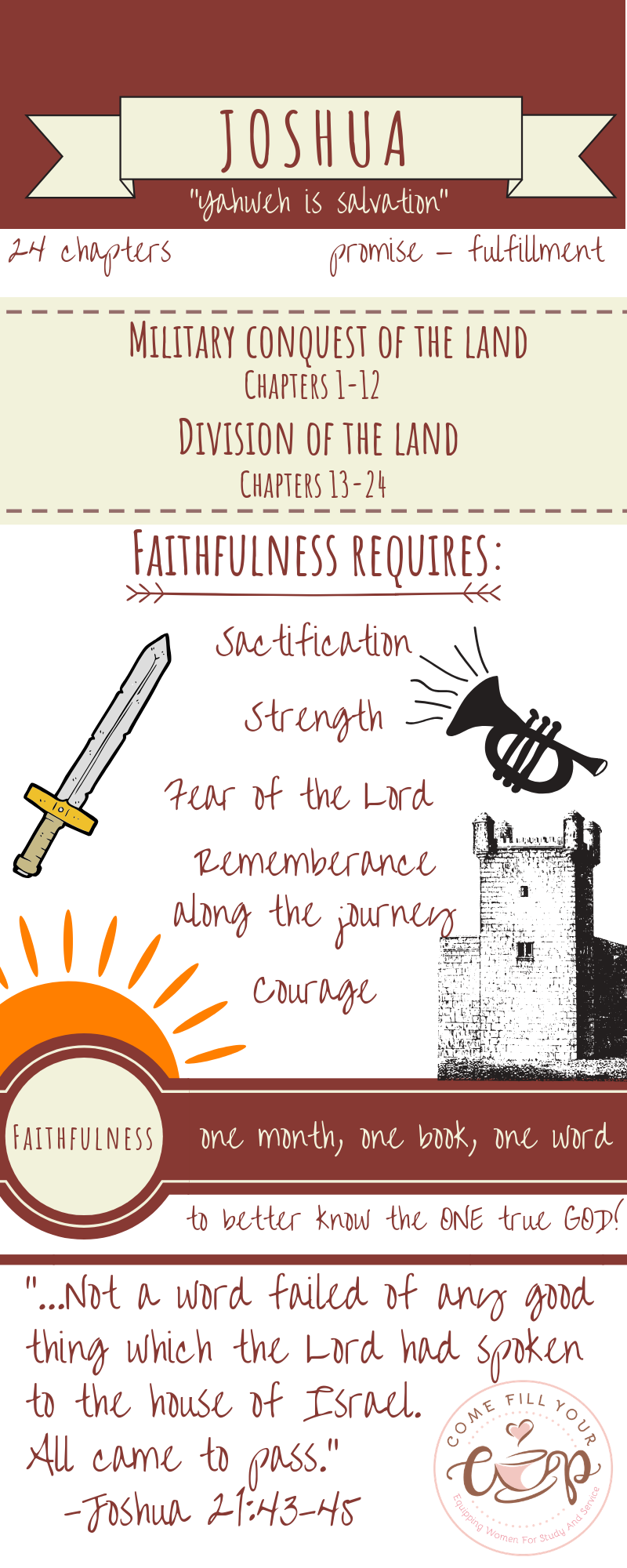From the title of the book, it is easy for one to think that Joshua is the main character. However, the meaning of his name states, “Yahweh is salvation.” Joshua is secondary to the God of heaven whose mercy, might, and majesty are fully on display throughout these twenty-four chapters.
 The book of Joshua can be divided into two main sections. Chapters 1-12 detail the military conquest of the land. Chapter 13 begins the division of the land until the final two chapters where Joshua addresses the Israelites for the last time. The entire account is an exciting time of transition for God’s people. Under new leadership, there is a shift from primarily receiving God’s instruction to putting it into practice. Joshua is a bridge between promise and fulfillment, but God’s people must uphold their end of the covenant. As they wholly follow the Lord and enlarge their geographical borders, they also increase their trust and reliance on Him.
The book of Joshua can be divided into two main sections. Chapters 1-12 detail the military conquest of the land. Chapter 13 begins the division of the land until the final two chapters where Joshua addresses the Israelites for the last time. The entire account is an exciting time of transition for God’s people. Under new leadership, there is a shift from primarily receiving God’s instruction to putting it into practice. Joshua is a bridge between promise and fulfillment, but God’s people must uphold their end of the covenant. As they wholly follow the Lord and enlarge their geographical borders, they also increase their trust and reliance on Him.
A major theme that is seen throughout Joshua is faithfulness. It is also our challenge word for the month. Though the word itself is scarcely used, its characteristics are evident. We see the trusting obedient faith of individuals like Rahab (2:1-21) and Caleb (14:6-14). Large groups of fighting men faithfully followed God, trusting in His might even when it defied logical military tactics. We also see consequences of unfaithfulness in men like Achan (7:10-26). However, the faithfulness of God is never in question but only further confirmed as summarized in Joshua 21:43-45, “…Not a word failed of any good thing which the Lord had spoken to the house of Israel. All came to pass.” Notice these characteristics and observations about faith seen in the book of Joshua.
Faithfulness requires preparation through sanctification. Upon crossing over the dry Jordan into Canaan (enemy territory), an ordinary military general might have set his army up in defensive formation. But God put His fighting men in arguably the most vulnerable of positions. The key to their future victories was not in their physical might, but in their sanctification through circumcision and observing the Passover (5:1-12). Sanctification was again required before the camp could be victorious because of the sin of Achan (7:13). Many good deeds can be done in the name of the Lord that we serve, but if we don’t first take care of our sanctification and holiness, it may cost us the victory!
Faithfulness requires strength. As His chosen leader, God knew Joshua needed to exhibit strength so that the people would follow him (1:6-18). He also knew the fighting men would need strength in the face of seemingly insurmountable tasks. It is still needed to faithfully serve the Lord today, but true victory comes when we realize the source of that strength is not our own, but in the One whose promise is, “I will never leave you nor forsake you” (1:5; Heb 13:5).
Faithfulness requires a fear of the Lord. Fear can paralyze or cause us to bend where we normally would not. The Gibeonites deceived Joshua because they were afraid (9:24). The inhabitants of Jericho, out of fear, turned to military strength for salvation, but it was a godly fear that prompted Rahab to seek salvation from the spies (2:9-10). It is no wonder that God repeatedly encouraged His people “do not be afraid or dismayed” of those that they would come against, but rather fear the Lord and trust in His might (4:24; 24:14)!
Faithfulness requires remembrance along the journey. Several physical monuments were erected along the Israelites’ journey (4:1-9). They needed a reminder for themselves and future generations of the mighty works of the God. Joshua re-read all the words of the law before the entire assembly (8:34-35). They needed to recall what God had asked them to do. Though memorials for our Christian walk primarily consist of our weekly observance of the Lord’s Supper (Acts 20:7), there is always a need to be reminded of His word.
Faithfulness requires courage. Bravery in the face of fear, as we tend to think of courage, is an integral part of serving with faithfulness. However, the Hebrew word translated courage in Joshua means to be mentally and physically alert. It is easy to see why alertness is essential for an army, and both uses of the word are equally necessary in our battle with Satan as God’s people aim to live separate from the world (I Peter 5:7-9).
Like the Israelites, God calls us to do difficult things. Like Joshua, the choice is completely up to us if we will faithfully and courageously serve Him (24:15). It requires great dedication to go with God every step of the way, but thanks to books like Joshua, we can be confident God will be with us!
by Kathryn Baker

 Welcome! We are so glad you stopped by. Come Fill Your Cup is a group of Christian ladies dedicated to equipping women for study and service. We know you are busy and that life’s hectic pace pulls you in so many directions, but you can’t truly be the woman God desires unless you take time to fill your own cup…not with spa days (though we love a good spa!) or the latest novel…but with God’s Holy Word. We want to help you with that! Our goal is to reach you in the midst of your busy day and give you encouragement, education, and fellowship as you strive to live the life God has laid before you. Our prayer is that we can help fill your cup so that you, in turn, can overflow to all those around you. So, as we like to say…come fill your cup, and let it overflow!
Welcome! We are so glad you stopped by. Come Fill Your Cup is a group of Christian ladies dedicated to equipping women for study and service. We know you are busy and that life’s hectic pace pulls you in so many directions, but you can’t truly be the woman God desires unless you take time to fill your own cup…not with spa days (though we love a good spa!) or the latest novel…but with God’s Holy Word. We want to help you with that! Our goal is to reach you in the midst of your busy day and give you encouragement, education, and fellowship as you strive to live the life God has laid before you. Our prayer is that we can help fill your cup so that you, in turn, can overflow to all those around you. So, as we like to say…come fill your cup, and let it overflow!
Leave a Reply